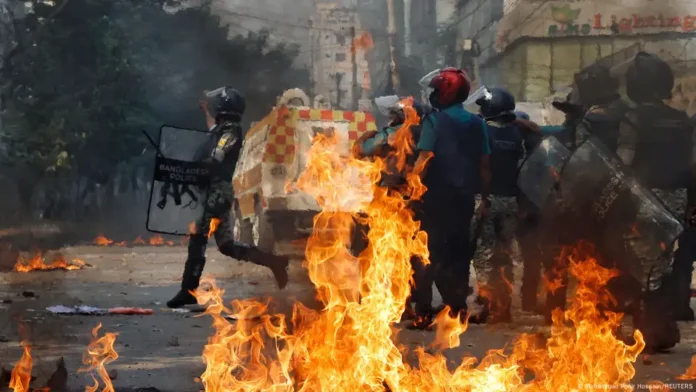Dhaka, Bangladesh – The ongoing anti-government protests in Bangladesh have intensified, leading to a death toll of at least 91 people, including 13 police officers. The demonstrations, initially sparked by opposition to a controversial civil service quota system, have evolved into a broader movement demanding the resignation of Prime Minister Sheikh Hasina.
Violence and Clashes Erupt Across Bangladesh
Violent clashes have erupted between demonstrators, police, and supporters of the ruling Awami League party. Casualties have been reported in multiple regions, including Dhaka, Bogura, Pabna, Rangpur, Magura, Comilla, Barisal, and Feni. Authorities have resorted to using tear gas, rubber bullets, and live ammunition to disperse protesters, resulting in numerous injuries.
Government Imposes Curfew and Internet Shutdown
In response to the escalating violence, the government has imposed an indefinite nationwide curfew starting at 6 PM local time. Additionally, internet access on mobile devices has been blocked to curb the coordination of protests. Over 11,000 people have been arrested in recent weeks as part of a major crackdown on demonstrators.
Prime Minister Sheikh Hasina has labeled the protesters as criminals and saboteurs, insisting that the government will take a firm stand against them. Despite offering unconditional dialogue with student leaders, the protesters have rejected her overtures.
Protesters’ Demands and Nationwide Mobilization
The protests began in July with students demanding the abolition of a quota system that reserved 30% of civil service jobs for the families of war veterans. Despite the government’s decision to reduce the quota to 5%, the movement has grown, with demonstrators now calling for Hasina’s resignation and accountability for the violence.
Leaders of the protest movement, including Asif Mahmud of the Anti-Discrimination Student Movement, have called for a nationwide march to Dhaka to lay siege to the city. Protesters are also urging citizens to engage in non-cooperation by not paying taxes or utility bills.
Impact on Bangladesh and Future Outlook
The unrest poses a significant challenge to Hasina’s administration, which won a fourth consecutive term in January elections boycotted by the main opposition party, the Bangladesh Nationalist Party (BNP). The protests have garnered support from various segments of society, including some ex-military personnel who have condemned the government’s use of force.
Political analysts suggest that the government’s firm stance and the protesters’ determination make the situation highly volatile. The next few days are seen as crucial for both sides, with potential for further escalation if a resolution is not reached.
International Attention and Media Coverage
International media outlets have highlighted the severity of the situation. The BBC reported on the extensive use of live ammunition by both police and ruling party supporters. CNN emphasized the government’s imposition of curfews and internet shutdowns as measures to control the protests. Al Jazeera provided detailed accounts of the clashes and the protesters’ demands for Hasina’s resignation.
As the situation continues to develop, the international community is closely monitoring the events in Bangladesh. There are growing calls for both the government and protesters to seek a peaceful resolution to the crisis.
For continuous updates on this developing story, stay tuned to QuickPost News.




